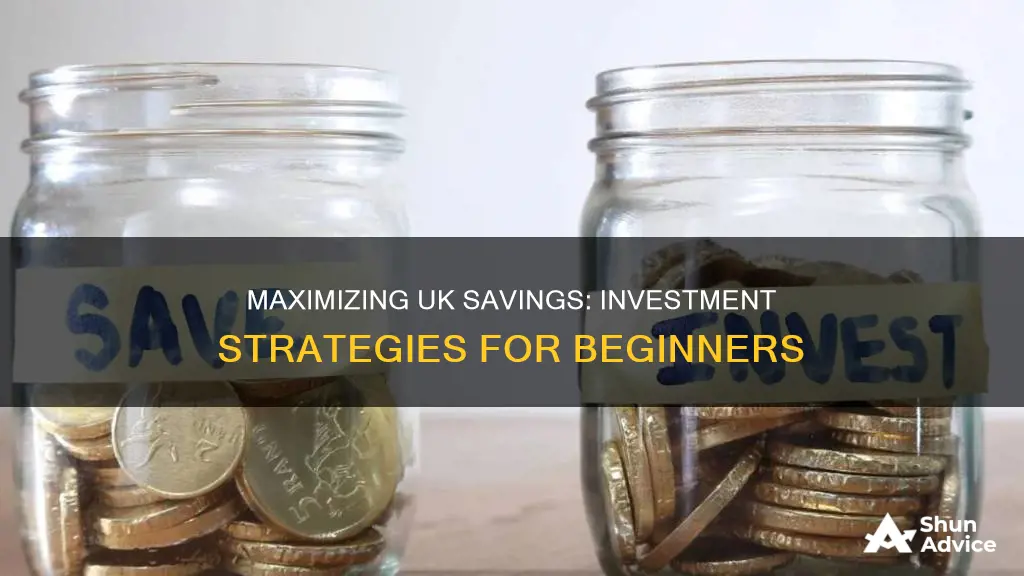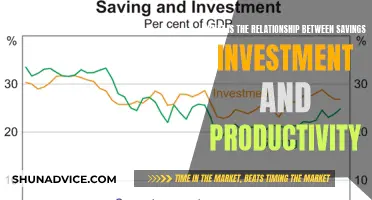
Investing your savings can provide you with long-term financial security and help you build your wealth over time. However, it's important to understand the risks involved, as there are no guarantees when it comes to investing. The value of your investments can go down as well as up, and you may get back less than you put in. Therefore, it's generally recommended to invest for the long term (at least five years) to ride out any bumps in the market.
There are several options to consider when investing your savings in the UK, each with its own advantages and risks. These include investing in stocks, property, shares in a fund, exchange-traded funds (ETFs), stocks and shares ISAs, high-interest savings accounts, cash ISAs, and peer-to-peer lending, among others.
Before investing, it's crucial to assess your financial situation, risk tolerance, timeline, and financial goals. It's also important to have an emergency fund and ensure any debts are under control.
Doing your research and seeking independent financial advice can help you make informed decisions about how to invest your savings in a way that aligns with your goals and risk appetite.
| Characteristics | Values |
|---|---|
| Risk | There is a risk of losing money when investing. |
| Returns | Investments can provide strong returns over the long term. |
| Goals | It is important to know your savings goals before investing. |
| Time horizon | Investments are recommended for the long term (5+ years). |
| Diversification | Diversifying investments can help reduce risk. |
| Taxes | Tax-efficient investment options include ISAs and pensions. |
| Research | It is important to do your own research before investing. |
| Advice | Seek independent financial advice if unsure. |
What You'll Learn

Stocks and shares ISAs
You can invest in shares, funds, investment trusts or bonds using a stocks and shares ISA. The value of your investments can fall as well as rise, so there is always a risk that you may lose money.
To open a stocks and shares ISA, you must be aged 18 or over, a UK resident for tax purposes, and not have subscribed to another stocks and shares ISA for the current tax year. The total amount you can save in ISAs in the 2024/2025 tax year is £20,000. This is your annual ISA allowance and can be spread across multiple stocks and shares ISAs with different providers, or other types of ISA such as a cash ISA.
There are no guarantees when investing in stocks and shares. The value of your investments can go down as well as up, and you could lose all the money you invest. It is recommended that you invest for the long term (at least five years) to allow enough time to recover from any losses.
There are different ways to invest in stocks and shares, including:
- Using a platform: You can buy and sell individual company shares through an online platform or stockbroker.
- Funds: Investment funds pool money from multiple investors to buy a diversified portfolio of stocks and shares.
- Exchange-Traded Funds (ETFs): ETFs are traded on the stock exchange and track various indices or assets.
- Robo-advisers: Robo-advisers choose an investment portfolio for you based on your attitude to risk and investment goals.
Before investing in a stocks and shares ISA, it is important to consider your financial situation and risk tolerance. Investing is risky and may not be suitable for everyone, especially if you are risk-averse. It is also important to have an emergency fund of around three to six months' worth of expenses saved before investing.
Equity Saving Schemes: A Guide to Investing Wisely
You may want to see also

High-interest savings accounts
Notice Accounts
Notice accounts allow you to access your money after a set notice period, typically between 30 to 60 days. They usually offer competitive variable interest rates, but they may not be suitable for emergency funds as you can't access your money immediately.
Fixed-Rate Bonds
Fixed-rate bonds allow you to lock away your money for a set period, during which the interest rate won't change. This stability makes them attractive during uncertain times or when interest rates are falling. The longer the term, the higher the interest rate tends to be.
Cash ISAs
Cash ISAs, or Individual Savings Accounts, are similar to traditional savings accounts but provide the benefit of tax-free savings. There's an annual limit of £20,000 on deposits.
Instant Access Cash ISA
This type of ISA lets you deposit and withdraw money at any time without penalty, although your ISA provider may impose some restrictions.
Regular Savings ISA
Regular savings ISAs offer a fixed rate of interest as long as you deposit an agreed amount each month.
Fixed-Rate Cash ISA
With a fixed-rate cash ISA, you lock your money away for a set period to earn a competitive interest rate. The longer the term, the higher the interest rate tends to be.
Children's Savings Accounts
Children's savings accounts typically offer more competitive interest rates than adult savings accounts, making them a good way to invest for your child's future. You can open a junior ISA, which offers an annual allowance of £9,000.
Lifetime ISA (LISA)
A Lifetime ISA is a type of savings account designed for people aged 18 to 40 to help them buy their first home or save for retirement. The government will add a 25% bonus to your savings, up to £1,000 per year, until you turn 50. You can choose between a cash LISA and a stocks and shares LISA, depending on your risk tolerance and time horizon.
Rajiv Gandhi Equity Savings Scheme: A Smart Investment Move
You may want to see also

Investment funds
Funds are a simple way to gain exposure to a wide range of assets, including shares, bonds, property, and commodities. They are also called collective investments because they represent lots of investors' money combined into a pool, which is run by an investment manager.
There are two main types of funds:
- Equity funds: These are made up of shares in a company or companies. They can be a good option if you want to aim for higher returns, but they are higher risk than bonds.
- Bond funds: These are essentially loans to companies or governments, and they pay you an interest payment (a coupon) and return your original loan amount at an agreed date. Bond funds are deemed lower risk than equity funds, but the returns tend to be lower as well.
When investing in funds, it's important to diversify your portfolio to reduce risk. This means investing in a range of different assets, sectors, and countries. You can also choose to invest in a ready-made portfolio, where a robo-advisor will make investment decisions on your behalf based on your risk tolerance and financial goals.
Investing in funds typically involves fees, so it's important to consider the costs and charges carefully when choosing a fund. You can invest in funds through a platform or directly with a fund provider.
Monthly Savings: Invest Wisely, Grow Your Wealth
You may want to see also

Property
Investing in property can be a good way to make money, but it's not without its risks and costs.
Renting out a house or flat
Renting out a property can provide an income, but you take on the responsibilities and expenses of becoming a landlord. If you don't have the cash to buy a property outright, you'll likely need a buy-to-let mortgage.
Renovating properties to sell on
You can also make money by buying properties, renovating them, and then selling them on for a profit.
If you don't want to buy a property yourself, you can invest in property by pooling your money with other people in a property investment fund. Real estate investment trusts, for example, can be bought into relatively cheaply, and distribute 90% of the money they make in rents back to investors.
Things to consider
For a buy-to-let investor, the average UK property yield is around 5% gross (before tax), but there are massive regional variations.
The level of tax relief available for buy-to-let investors has been reduced, while the stamp duty surcharge has increased to 5%. This means buy-to-let investing is only attractive if you can buy the property with little to no mortgage.
There are also costs to consider, such as maintenance and repairs, as well as letting agent and management fees if you use them.
Diversification
As with any investment, it's important to diversify your portfolio to reduce risk. This means investing in different companies, industries, regions of the world, and asset classes.
Seeking financial advice
If you're unsure whether investing in property is right for you, consider seeking independent financial advice.
Invest Wisely to Secure Grandkids' College Education
You may want to see also

Diversification
Secondly, you can diversify geographically by investing in companies or assets from different countries or regions. For instance, you could invest in a mix of UK, US, and emerging market stocks. This can help to protect your portfolio from country-specific economic shocks or political events.
Thirdly, you can diversify across different asset classes, such as stocks, bonds, property, and commodities. These different asset classes tend to perform differently in different economic conditions, so having a mix can help to reduce risk. For example, stocks typically perform well when economic growth is strong, while bonds may be a better investment when growth is slow or negative.
Finally, you can also diversify across different investment funds or products. For instance, you could invest in a mix of actively managed funds and passively managed funds (which track a particular stock market index).
By diversifying your investments in these ways, you can reduce the risk of losing money and improve the long-term performance of your portfolio. However, it's important to note that diversification does not completely eliminate risk – it is still possible to lose money on a diversified portfolio, especially in a severe market downturn.
Yotta Savings: A Smart Investment Strategy for Your Money
You may want to see also
Frequently asked questions
Saving is putting money aside, usually into a savings account, where it will earn interest. Investing is taking some of your money and trying to make it grow by buying things you think will increase in value, such as stocks, property, or shares in a fund.
It's recommended that you save at least three months' worth of living expenses in an easily accessible savings account. Some recommend saving up to six months' worth. You should also save 10% of your wages each month if you can.
If you have expensive debts, focus on paying those off first. If you have cheaper debt, such as a 0% credit card, consider saving in a high-interest account and then paying off the debt. If you have no debts but still think you'll struggle to save, use a budget planner to cut costs.
Investing usually beats savings returns over time, and you can earn an income through dividends. If you invest through your pension, you get tax relief. However, your investments can go up and down, which can be stressful, and if you need your money when markets are down, it won't have time to recover. Investing also requires more knowledge than saving.
You can invest in stocks and shares, either by using a platform or stockbroker, or by investing in funds or exchange-traded funds (ETFs). You can also invest in stocks and shares ISAs, pensions, peer-to-peer lending, property, or physical assets such as art, wine, or gold.







